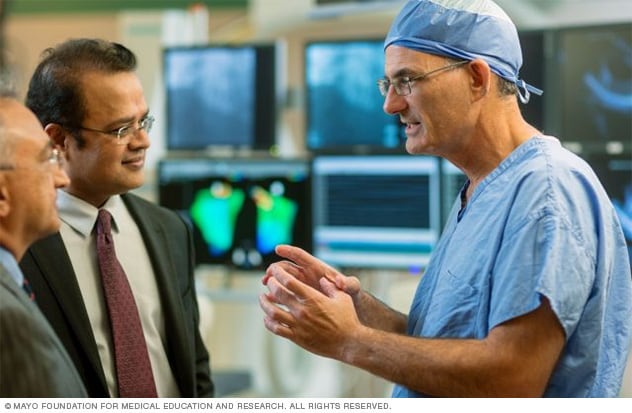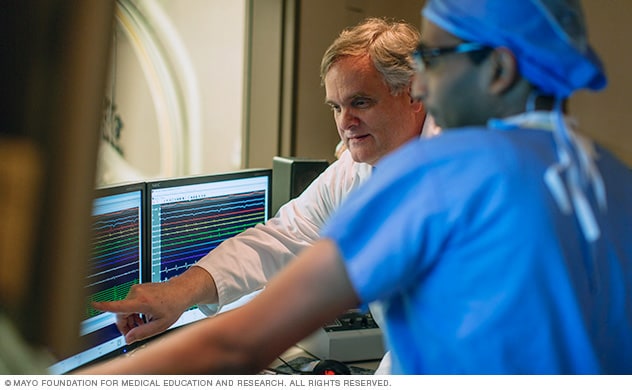 Bringing artificial intelligence (AI) into clinical practice
Bringing artificial intelligence (AI) into clinical practice
Heart doctors and scientists work together to bring the benefits AI to people with diseases of the heart and blood vessels.
Mayo Clinic is a leader in the movement to bring artificial intelligence (AI) tools and technology into clinical practice to benefit people who have or are at risk of heart disease. The clinic's AI cardiology team is applying these new approaches to early risk prediction and diagnosis of serious or complex heart problems. People who receive heart care from Mayo Clinic's Department of Cardiovascular Medicine may benefit from access to the clinic's leading-edge research and expertise in AI cardiology to improve patient care.
AI is intelligence exhibited by machines. It touches almost every facet of modern life, including medicine. AI is being used at Mayo Clinic to program computers. The goal is to process and respond to data quickly and consistently for better treatment outcomes.
Uses for AI include detecting heart disease, treating strokes faster and enhancing diagnostic radiology capabilities. For example, a Mayo Clinic study applied AI techniques to a new screening tool for people with a certain type of heart problem that has no obvious symptoms. The condition is called left ventricular dysfunction. The AI-assisted screening tool found people at risk of this condition 93% of the time. To put that in perspective, a mammogram is accurate 85% of the time. In addition, AI developed at Mayo Clinic is used in Apple Watch to detect a weak heart pump (low ventricular ejection fraction).
These technologies complement the knowledge of doctors. Ideally, by bringing together direct care and data analysis, AI cardiology allows doctors to spend more time with their patients and improves the shared decision-making process.
Some basics
Artificial intelligence is the ability to make computers or machines learn to solve problems that would otherwise require human effort. Advances in computing power have made it possible to analyze large amounts of data quickly with consistency and accuracy. This has enabled health care scientists to apply AI to huge, complex data sets in a way that improves decision-making, diagnosis and treatment by detecting patterns in patient data.
The basic building block of an AI system is a "neural network." For example, a computer system is trained by ingesting and analyzing hundreds of thousands of sets of similar readings. It becomes experienced in looking at a focused problem, such as ECGs. The result is that an AI system can read a simple test, detect a heart condition and predict possible future problems.
Mayo Clinic leaders have identified several areas of opportunity for AI in health care. The clinic is well situated to advance AI because its long history of high-volume patient care has generated a massive database of historical genomes, microbiomes, ECGs, diagnostic images and other test results. That coupled with the clinic's strong culture of close collaboration among medical doctors, engineers and scientists is driving AI into health care in meaningful ways.
You can find a deeper look at computer neural networks and deep learning (strong AI) here.
From research to clinical practice
Cardiovascular medicine doctors and scientists at Mayo Clinic are combining AI with clinical practice for better care. Here are three examples that have moved from the research stage to use in the clinic:
- Helping people who have had a stroke. In emergency rooms, when people come in with a stroke called an intracerebral hemorrhage, they get a CT scan. That scan is examined by a computer trained to analyze CT data. This method has been shown to cut the time to diagnosis and limit brain damage.
- Preventing heart problems. Applying AI to ECGs has resulted in a low-cost test that can be widely used to detect the presence of a weak heart pump. A weak heart pump can lead to heart failure if left untreated. Mayo Clinic is well situated to advance this use of AI because it has a database of more than 7 million ECGs. First, all identifying patient information is removed to protect privacy. Then this data can be mined to accurately and quickly predict heart failure.
- Detecting atrial fibrillation (AFib) sooner. AI-guided ECGs also are used to detect faulty heart rhythms before any symptoms are evident. A faulty heart rhythm also is called atrial fibrillation.
Innovation through collaboration
 A team approach
A team approach
A doctor (right) works with an Electrophysiology Laboratory colleague to read a test result.
The collective effort of experts is driving the rapidly growing field of artificial intelligence in health care. At Mayo Clinic, several medical and surgical specialties have validated approaches to improve clinical care. These groups include cardiovascular medicine, neurology, oncology and radiology, Their advances are shared in the medical literature so that they can be adopted widely to benefit people everywhere.
These AI tools and techniques also play an important role in education. They are used by Mayo Clinic's medical students, residents, fellows and experienced surgeons to learn new or uncommon procedures. Mayo Clinic leads by holding artificial intelligence symposiums that bring together doctors and scientists to advance this science in health care.
Research innovations in cardiovascular artificial intelligence
The Mayo Clinic cardiovascular medicine team was among the first specialties to rapidly develop and validate these new AI tools and technologies. Possible future uses still in development at Mayo Clinic include:
- Predicting risk early in conditions such as embolic stroke.
- Monitoring the heart and detecting arrhythmia in smart clothing projects.
- Developing AI technology compatible with smartphones and high-tech stethoscopes.
Mayo Clinic physicians, scientists and engineers continually advance the study and practice of artificial intelligence that improves health care. Find more about artificial intelligence at Mayo Clinic here.
See a list of publications about cardiovascular AI by Mayo Clinic authors on PubMed, a service of the National Library of Medicine.
Research profiles
- Paul A. Friedman, M.D.
- Suraj Kapa, M.D.
- Francisco Lopez-Jimenez, M.D., M.B.A.
- Peter A. Noseworthy, M.D.
Nationally recognized expertise
Mayo Clinic is top-ranked in more specialties than any other hospital and has been recognized as an Honor Roll member according to the U.S. News & World Report's 2024-2025 "Best Hospitals" rankings.
Mayo Clinic campuses are nationally recognized for expertise in cardiology and cardiovascular surgery:
- Mayo Clinic in Rochester, Minnesota, Mayo Clinic in Phoenix/Scottsdale, Arizona, and Mayo Clinic in Jacksonville, Florida, are ranked among the Best Hospitals for heart and heart surgery by U.S. News & World Report.
- Mayo Clinic Children's Center in Rochester is ranked the No. 1 hospital in Minnesota, and the five-state region of Iowa, Minnesota, North Dakota, South Dakota and Wisconsin, according to U.S. News & World Report's 2024–2025 "Best Children's Hospitals" rankings.
Contact
Arizona
Florida
Minnesota